Read Part One
The next morning we woke up to the sound of the bread man, (the bread made
by his wife and children from the village), followed by the fisherman who
had beached his boat several hundred yards away from us, two young boys
selling, tomatoes, cucumbers, melons, strawberries bananas, peas, oranges
onions. Followed by a truck with fresh water to top up your water tanks,
aqua rolls etc. The only thing you do not get here is electrics. A generator
is recommended. (In the village they will charge up your batteries).
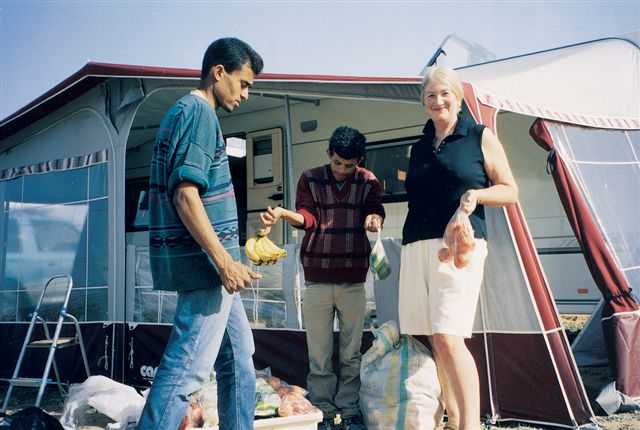
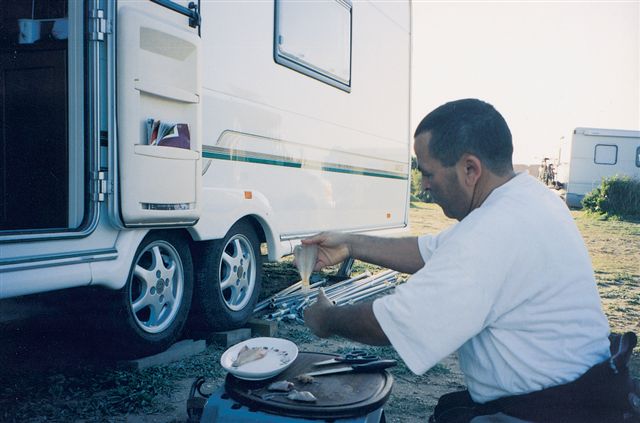
Veg & Fish Man
We put up the awning and met our neighbours. The nearest campervans being at
least 20 feet from us, plenty of space here. Not like Portugal and Spain,
which pack you in like sardines. We were surround by people from France,
Germany, Holland, Sweden, and Norway and all spoke English!! In the
afternoon we took a walk around the area and we found that we were not the
only English. We reckon there were about 15 to 20 which was a mixture of
Scottish and Welsh and Arthur aged 86 years on his own having towed his
caravan from Bournemouth. He told us that he had been visiting Morocco to
get away from the winters of UK for the past 25 years. He went on to say
that in the early days the roads were just dust tracks!!
The nearest large town to Taghazoute is the city of Agadir about 5 miles to
the south. Population 350,000 It was here in February 1960 it was flattened
by a massive earthquake killing 18,000 people. Today it is a modern city
with luxury hotels and a harbour, which caters for visiting cruise liners.
Agadir also has a modern supermarket. Most of the products being imported
from France. There is a very large souq, with plenty of bargains to be had,
if you are prepared to barter. There are plenty of good restaurants in
Agadir to suite all tastes and the pocket and with the main industry being
tourism its possible to buy alcohol. A mile or so before Agadir on the right
you pass some very large gas storage tanks. It is here that you can take
your gas bottles into for recharging. They do this while you wait and the
cost is half the price you pay in Europe.
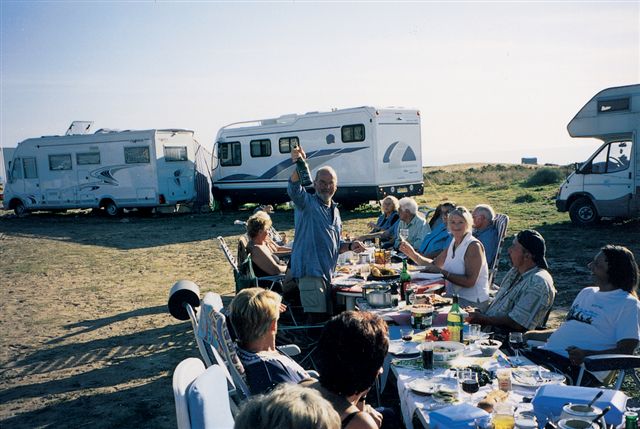
Liz’s Birthday
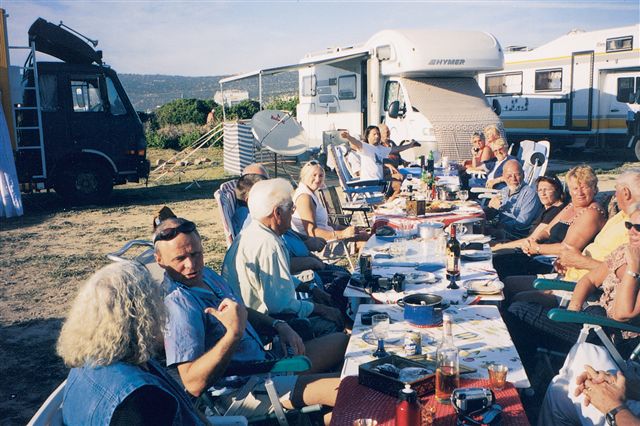
Liz’s Birthday
With Christmas approaching campers started to decorate their vans, we put up
lights in the awning got out the Christmas C Ds. On Christmas Eve we held a
party in the open air. The campers in the area brought their own food etc.,
and we celebrated Christmas and Liz’s Birthday, which was that day. The sun
shone all day, we went swimming in the Atlantic as the sun set over the
horizon. The party went on into the early hours.
The next day (Christmas Day) having made arrangements with the guards who
said at least one would sleep in the awning , we secured the caravan and
drove 200 miles over the Atlas Mountains to Marrakesh and booked into a
hotel for three days. The journey took eight hours. The road, which is the
main route from the docks of Agadir a single carriageway, was packed with
trucks, overloaded with goods which crawled up and over the passes with the
coaches and grand taxis over taking them on blind corners!! We came across
many accidents. We also had donkeys, camels and pedestrians to deal with,
plus you had to pass through every town and village en route. It was the
most dangerous road we had encountered since leaving home. We decided that
on our return we would take a quieter road over higher passes, with the Tizi-n-Test
pass being 2092 meters. This we did, there was less traffic and it was more
enjoyable as we saw more of the Moroccan day-to-day life and snow. Yes snow
it gets very cold up in the Atlas, and there are quite a few ski resorts in
this area.
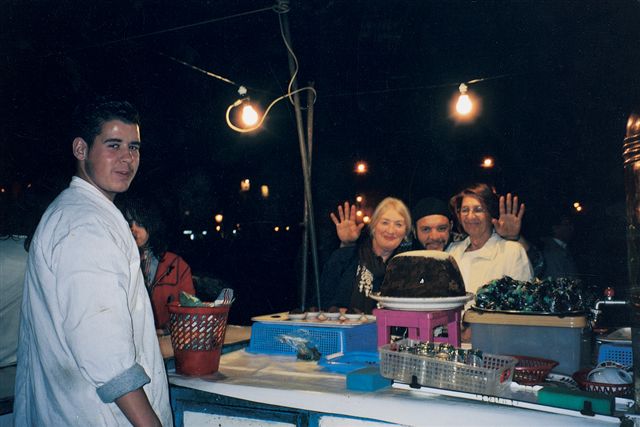
Marraskesh
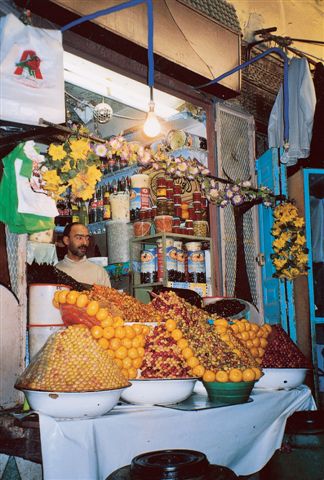
Marraskesh
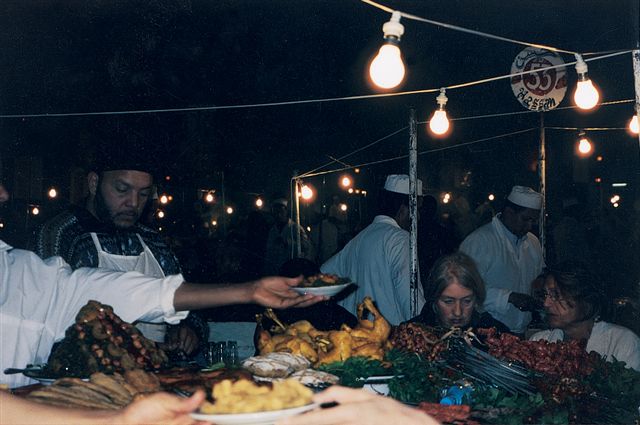
Marraskesh
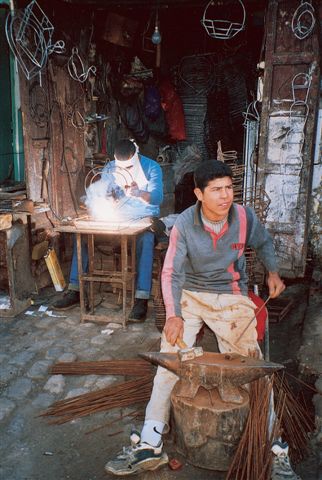
Marraskesh
Our hotel in Marrakesh was a budget one costing around £20-00 per night with
breakfast 5 minutes from Djemaa el-Fna, which is the world famous square in
the heart of the old city.
Marrakesh is becoming very westernised with many Europeans buying property.
but make a tour amongst the snake charmers, musicians, jugglers, and
storytellers in the Djemas el-Fna. To eat from the open-air food stalls in
the square is a must, and then to wander into the medina to reach the
traditional maze of the souqs with twisting alleys. Your eyes will pop out
of your head. Every thing happens here. Here you can witness the making of
slippers, rugs, dyeing textiles and the hammering, cutting and welding of
metals. Breathe in the aroma of spices from all over the world and sample
the beautiful olives, or drink Moroccan tea. You will need several hours to
take in this magic. As you stagger back into the Djemas el-fna amongst the
kerosene lanterns are the juice stalls, ready to quench your thirst. You may
think that all this is put on for the tourist; this might be in the case of
the water sellers and snake charmers. But take a good look at the crowd.
Most of them are locals, listening to the storytellers. We spent the next
two days taking in the Medina, visiting the Museum of Marrakesh, The Palais
de la Bahia and having afternoon tea at Five Star La Mamounia Hotel built in
the 1920s for the French controlled Moroccan Railways, with its lush green
gardens. At the entrance “Bouncers” in Fes hats enforce the dress code. No
trainer’s, shorts or track suits bottoms. How much for the tea? Take a
credit card!!
We returned to Tagazoute late at night on the 28th and as we tried to get
onto the beach area where our caravan was. out of nowhere we were surrounded
and stopped by several Arabs carry flashlights and pick axe handles, quite a
shock to the system. It turned out to be the guards. We were escorted back
to the caravan to find everythimg was how we left it on Christmas day.
On the 30th we departed with caravan in tow to head down to Tan-Tan a town,
300 miles south of Agadir on the edge of the Sahara Desert. We had been
informed that the Paris Dakar Rally was due to make an overnight stop at a
military airfield some miles south of the town. Several campervans had
departed the day before to head for Tan-Tan. Late morning we passed through
Tiznit known as Silver City and took the coast road to Sidi Ifni. We could
see many wrecked trawlers and ships up on the rocks along this coastline
being pounded by large Atlantic rollers. As we left Sidi Ifni behind us and
headed once again inland the scenery began to change into a desert
landscape. It was getting late in the afternoon when we saw a sign,
“camping”. We turned in the direction a single-track road, desert on either
side and within 20 minutes we arrived at the tiny oasis village of Abainou
surrounded by palm trees.
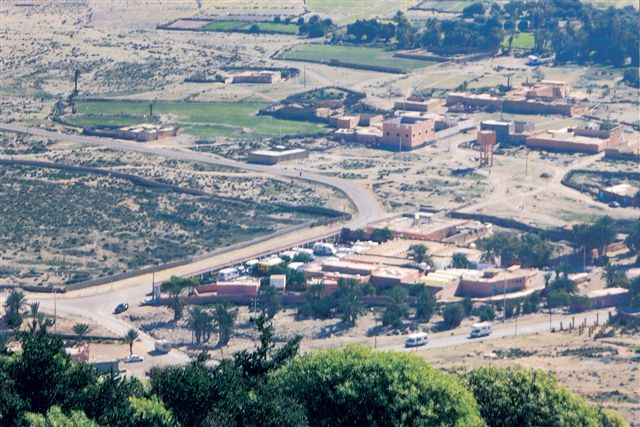
Camping Abainou
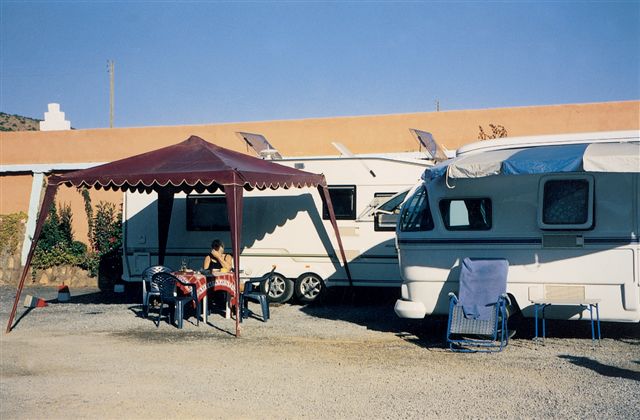
Camping Abainou
We entered a walled campsite to be greeted by the guys who had left
Tagazoute several days before. This oasis was a place of natural hot springs
with an indoor swimming pool, restaurant, electrics, water. All for 20
Dirham = £1.30 per night
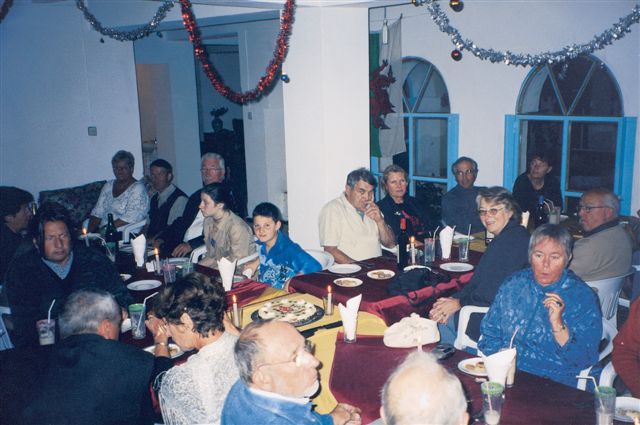
New Years Eve
We were told that a party had been arranged in the restaurant for the
following evening (New Years Eve) and that turned out to be great. We even
had a Scot who turned up in a kilt.
Dot and Jim Jones from Wales. who we would meet again later in the tour,
pulled into the campsite. They had converted mini bus and made into a
campervan at that present time they were touring the world. www.beady.com/roundtheworld
They were heading for Tan-Tan as most of the campers were. After the meal we
all ended up in the thermal swimming pool with the only light coming from
candles, which had been placed around the edge of the pool. And at midnight
we joined hands in the pool to “Auld Lang Syne”. A celebration night we will
remember for many a year.
The following day was a rest day; very few rose from their beds before
mid-day. I wonder why? Liz and I went exploring the hills on foot to the
rear of the campsite and we found the views from the top fantastic. You
could see for miles into the distant Sahara Desert. The following day we
left for Tan-Tan in a convoy of 6 to 8 vans.( Not recommended ).Within 10
miles we entered Guelmim know as the gateway to the Sahara. A dusty town
with a population of 120,000. I think we met everyone of the residents.!!
A guy from Norway called Verna was leading us. He drove a Nissan truck
converted into a camper, he took a wrong turn in the town centre and we
followed. Ever tried negotiating through narrow unpaved back streets with a
23foot twin axle? An hour or so later we were back on course after taking on
fuel. This would be the last petrol station before we hit Tan-Tan. With us
being so far south we were advised to fuel at every opportunity even if we
still had half a tank of fuel. This was due to the great distances between
towns, and you were not guaranteed the filling stations would have fuel.(
See notes below )
Within 20 miles the road disappeared. It just ended, and we were on a dust
track negotiating large potholes and other vehicles including large trucks
kicking up so much dust it became at times impossible to see. This went on
for 10 miles before we found a metallic road once again.
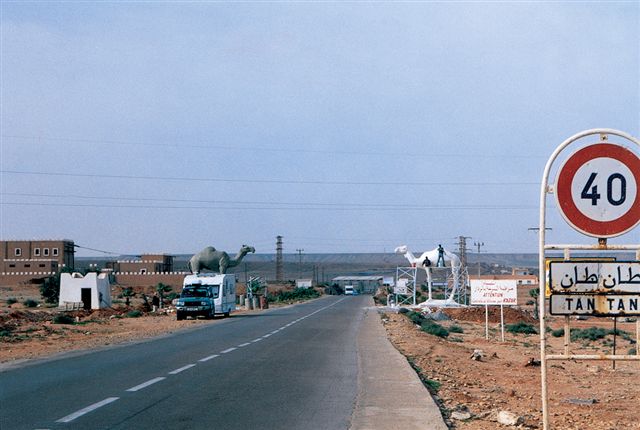
Entering Tan-Tan
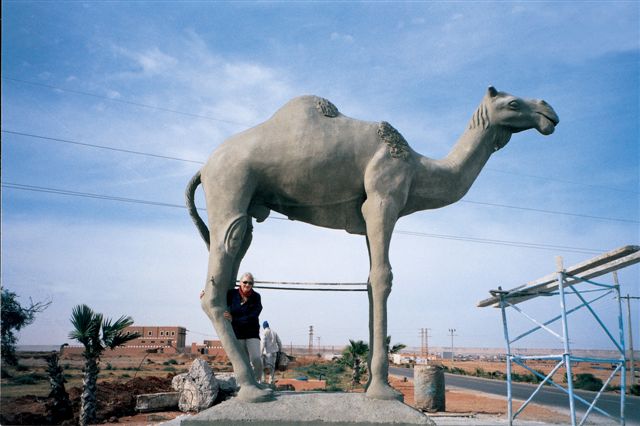
Entering Tan-Tan
We entered Tan-Tan between two large camels that were being constructed by
using cement and then painted white. Yes you do get white camels, they are
the most prized. We found the airport several miles south of the town built
high up on a plateau overlooking Tan-Tan in the distance. Plenty of activity
was going on, large tents, toilets, showers, food stalls were being erected.
Many campervans had already arrived and set up, to await the rally that was
due to arrive in a few days time. The Moroccan Army patrolled this area day
and night, and only Europeans without a pass could enter locals had to have
passes.
Read Part
Three |




















